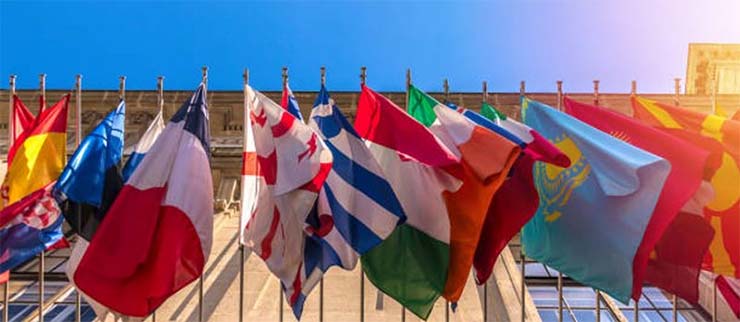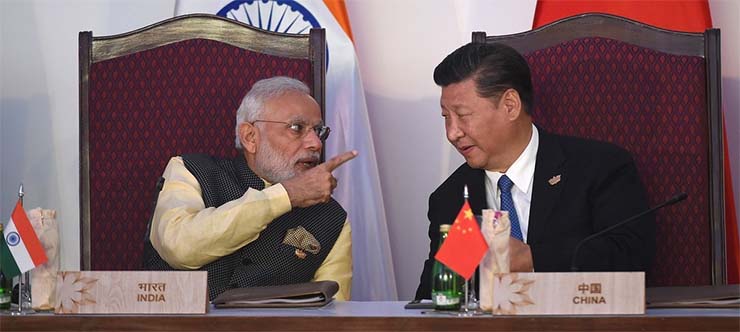
The year 2022 has been quite an eventful year in the diplomatic journey of the world’s sixth-largest economy. To begin with, the year has been dominated by the egregious February 24 Russian invasion of Ukraine, which is regarded undoubtedly as the single most important geopolitical event of the year. The war has proven to be the single most deadly conflict in Europe since the Second World War and has clearly sent shockwaves in the pandemic-induced new decade.
Not only has it undermined the nascent global economy recovering still reeling from the aftermath of the COVID-19 pandemic shock but has also caused the skyrocketing of oil and natural gas prices. As far as India is concerned, New Delhi has maintained a tightrope walk between Russia and the West; New Delhi has so far refused to call out Russia for its dastardly invasion of Ukraine and has refrained from the condemnation of Russian actions in several resolutions drafted by the Western powers in the UN Security Council and UN General Assembly.
What has been a display of remarkable diplomacy is India’s refusal to budge under Euro-American pressure to condemn Russia; interestingly India continues to buy cheap Russian oil at heavily discounted rates. However, New Delhi has condemned the Bucha massacre and has called for an immediate seizing of all hostilities and an end to the war through dialogue and diplomacy manifested in Prime Minister Narendra Modi’s remark “this era is not an era of war” at the SCO summit held in Uzbekistan in September this year.
Afghanistan
The takeover of Afghanistan in August 2021 by the Taliban gave a rude shock to the mandarins of foreign policy in New Delhi. However, instead of totally cutting off its presence on the ground, New Delhi chose to resort to a limited engagement, evident from the restricted opening of the Indian embassy and the high-level talks led by the joint secretary of the Ministry of External Affairs with officials of the Taliban regime.
India in a good neighbourly gesture sent humanitarian aid in the form of wheat, medicine and medical kits to needy Afghans. However, it has been right on the part of New Delhi not to recognise the Taliban regime as no country in the international community has recognised the insurgent political movement of Afghanistan.
The risk of the Afghan Taliban supporting anti-India terror groups such as Jaish-e-Mohammed and Lashkar-e-Taiba cannot be ruled out with a repeat of the 1990s ethno-separatist insurgency in Jammu-Kashmir occurring again.
China
Apart from the Russo-Ukraine war, China has presented the biggest challenge to New Delhi, bilateral trade continues to expand but all is not well at the border with the dragon. On December 9, clashes took place between Indian and Chinese troops in the Yangste sub-sector of the Tawang sector in Arunachal Pradesh. Reports of injuries on both sides have been reported with the Chinese being shocked by the readiness and alertness of Indian troops.
So far, 17 rounds of talks have been held to defuse tensions on India’s western border in Ladakh and it seems that tension has receded somewhat but there is much to go.
Foreign policy
The foreign policy of our country has been assertive with a lot of international events testing India’s diplomatic acumen. However, India’s foreign policy mandarins led by the highly capable Dr S Jaishankar have made it clear that India will not back down when it comes to defending India’s legitimate national interests. From the ‘Europe needs to grow out of the mindset’ remark to ‘India being a Vishwaguru’ is a testimony to India’s growing diplomatic and economic prowess across the world.
India’s foreign policy has been characterised by the exercise of strategic autonomy and the process of embarking on a balance of power approach; this is evident from the fact that India is allying with the USA, Japan etc. to balance China which appears to be the single biggest threat to the maintenance of the liberal rules-based international order.
A defining characteristic of Indian foreign policy is a strong emphasis on bolstering hard power and soft power at the same time to ensure that India is not taken lightly globally. The hard power aspect involves arming the armed forces to the teeth, the arrival of the last batch of Rafale fighter jets and the deal for acquiring some MQ-9B predator drones coupled with the theaterisation of military commands point to the restructuring of the armed forces.
The soft power influence is attributable to Indian films such as RRR, Kantara, KGF 2, and Brahmastra and the gargantuan response that it received from global audiences is a testimony to how India’s soft power influence is growing and growing. RRR is also India’s official entry into the 94th Oscar awards.
Challenges ahead
However, foreign policy is not an easy road with numerous impediments and challenges, some of which don’t appear to be too easy to solve, some of the challenges are:
Dealing with the dragon: This is going to be a real serious problem with the Indian foreign policy establishment having some serious thinking to do as to how to deal with the recalcitrant dragon, which is in no mood to relent when it comes to maintaining a calm and amicable border. The bigger challenge will be on how to reduce the burgeoning trade deficit that India has with China, notwithstanding the fact that China is India’s second-largest trade partner, the trade being in favour of the dragon.
India will need to ensure that the disadvantage doesn’t come back to arm-twist India into an uncomfortable position when it comes to dealing with the issue of sovereignty and national security.
Grim global economic outlook: With central banks around the world jacking up interest rates to fight unprecedented inflation rates going sometimes into double digits, it is going to undoubtedly affect India, with the RBI raising benchmark interest rates too with a hawkish stance it is clear that India needs to brace for global economic headwinds.

On the export front, particularly the merchandise export front, not everything is well, exports are declining owing to a slump in global consumer demand means that India will be growing slower than expected with the possibility of jobless growth. However, the silver lining in all of these is that Indian foreign exchange reserves are going high and the capital expenditure by the government is high which is pushing upward the GDP of the country. On top of that, India possesses the G20 presidency. But it will take some time for the global economy to recover following the COVID-19 pandemic and the Russo-Ukraine war shock.
COVID-19 resurgence: SARS-COV-2 is again on the prowl and this time the new variant BF.7 is on the prowl, the mammoth increase in COVID cases in China shows that India must be prepared to face the threat of a new COVID-19 wave with the possibility of a 2020-like re-run.
Also, growing concerns that future COVID variants could be vaccine resistant are adding to the woes, it is therefore imperative that India is geared up to face these seemingly new threats which if left unaddressed can become much more threatening.
Conclusion
As India enters the New Year with new aspirations, hopes and beliefs – it is necessary for the mandarins of Indian foreign policy establishment to continue with the realist-pragmatist foreign policy stand and prioritise national interests first instead of treading down an idealist path.
– The writer is currently working as a Research Associate at Defence Research and Studies (dras.in) and is a columnist. The views expressed are personal and do not necessarily reflect the views of Raksha Anirveda








